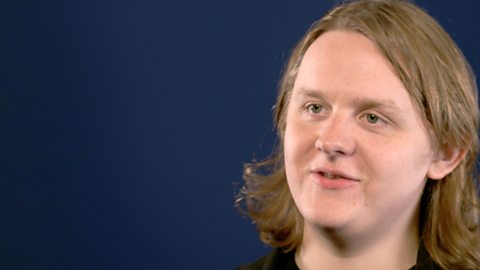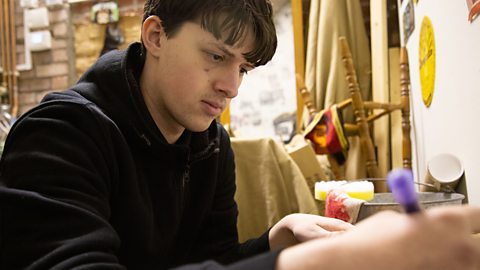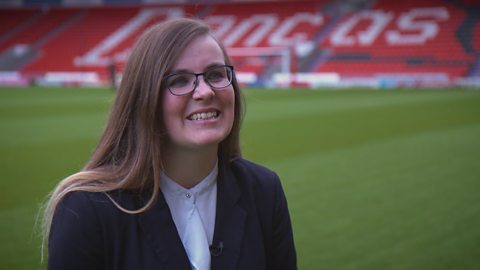Meet Roisin and find out about her life as a freelance music video director and stylist. Part of our Bitesize world of work series.
Roisin: Hi my name's Roisin O'Hare and I'm a freelance director and stylist.
Today we're here to direct a music video. I'm going to be directing it for an artist called Swerve. Whenever you start with a video the first thing I do is I get the song from the artist. And then I will listen to it a couple of times and then I'll create a video treatment based on and it will have shot types, the lighting, what I'm visually trying to achieve and that gets sent to the videographer, stylist and also the artist to get approval. The organisation kind of doesn't stop when you come to onset. I have my shot list and I'll be like literally ticking off as we go along. What we've got and what we still need to get, making sure that all the props are there, making sure that people arrive on time, so you've gotta send out call sheets.
When it came to A-levels. I did English, I did Media studies and I did Art A-level. So all three of those kind of inform the career that I'm currently doing. I'm a director. So I don't shoot, but know how to use a camera. I know what language to explain a videographer to get what I need. So it's not necessarily my technical abilities that I'm proud of, because I have none, it's my communication skills and organisation and I think that comes from having that background in English as well. Like I was incredibly good at that, always incredibly good at communicating a visual idea through words. I personally did not want to go to uni, but I knew that uni was a means to an end for me to move country and be able to have opportunities available to me. And also, the three years of university, I learnt a lot whilst I was in university. But if I had of spent three years full time assisting I probably would have learnt a lot more.
So we've just finished in here and we done our white cove shots and we also did our prop shots, and now we're going to go into a blackout studio. When I started in the industry I started off by interning. I think that's how a lot of people start off in this. So I'm currently a freelancer in the industry. I personally have felt like I've progressed a lot further, a lot quicker, from freelancing. I'll get up at, like 6 a.m.
Sorry.
In terms of the hours that you work, I personally get up at about 6 a.m. and I may be working through until 11 p.m. or something like that that night. Assisting you don't get paid a lot, you may not appear at all. I worked for two years for free, but it's the experience that is a valuable thing. I always say to people, "You're not paying for my time, what you're paying for in those four years of experience."
Experiment. Experiment with everything that, literally, like. Also, just like start banking your inspiration, start questioning how you look at things, how you look at the world, how you look at issues. What is important to you and what's not. And it goes back to as simple as what do you like and what you don't like. Starting points for everyone is that I think, for sure. Use social media. Utilise social media to its fullest because that's how I make most of my contacts, that's how I get most of my work, that's how anyone knows me. Like I don't have a huge following, but I have the right people following me and I think that's what's important. It's like you may not have, you know, any like huge artists following you but their publicists following you. And their publicist is the one who gets you work. When I was growing up I didn't necessarily feel like I was anything too important or anything too special or someone that people could look up to because I was a little bit of an oddball. But now, the fact that like some people even my own age like from home would be like, 'what you're doing is really inspiring'. Or like. How did you do that? Like how did you get into that? That's probably one of the biggest perks you can have, that you're having like an impact on like another little weird kid from Belfast. Who doesn't think they're ever going to be anything great.
I was always incredibly good at communicating a visual idea through words.
Roisin directs music videos. She listens to an artist’s song and creates a video treatment for it. That includes writing down shot lists, ideas for lighting and what she’s trying to achieve visually
She works long days - sometimes from 6am to 11pm
Roisin is a freelancer, which means she is self-employed. She feels she has been able to progress further and more quickly this way
Roisin studied English, Media Studies and Art at A-level. She didn’t want to go to university, though she did recognise that it might have opened up opportunities for her, such as allowing her to move to another country
She says it’s important to get as much experience as possible. Often this can be low- or unpaid work
Roisin believes that the key skills for this role are good communication and organisational skills. It also helps to be able to play around with your ideas.

A similar role to a music video director is a TV and film directors. They lead the creative and technical production for cinema and television.
What to expect if you want to be a TV or film director
- TV or film director average salary: variable
- TV or film director typical working hours: 39 to 41 hours per week
What qualifications do you need to be a TV or film director?
You could get into this role via a university course or a college course such as a Level 3 Diploma or a T-level in Media, Broadcast and Production (England-only, from Sept 2023). You can also work towards the role, produce and release your own films or do specialist courses run by private training providers.
Sources: LMI for All, National Careers Service, GOV.UK
This information is a guide and is constantly changing. Please check the National Careers Service website for the latest information and all the qualifications needed and the GOV.UK website for more on T-levels.
For careers advice in all parts of the UK visit: National Careers Service (England), nidirect (Northern Ireland), My World of Work (Scotland) and Careers Wales (Wales).

Work experience in your area
Find work experience placements with Workfinder.
Tips and advice
Help with interviews, writing a CV and all things work experience related.

Lewis Capaldi: singer-songwriter. video
Lewis Capaldi gives the lowdown on his life in the music industry.

Alfie: trainee film director
He is a trainee film director at Blaenau Gwent Film Academy.

Hayley: media assistant video
Hayley works for Doncaster Rovers and explains how she got there.
